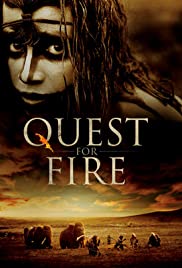
QUEST FOR FIRE
France, 1981, 95 minutes, Colour.
Everett Mc Gill, Ron Perlman, Rae Dawn Chong.
Directed by Jean- Jacques Annaud.
Quest for Fire was a film both acclaimed and criticised on its first release. It is an ambitious Canadian- French co-production filmed all around the world from Scotland to Africa. The scenery and the use of locations is excellent.
However, the screenplay by Gerard Brach (writer for Roman Polanski for such films as Tess) is more controversial. It is an adaptation of a French children's fantasy of 1911 by one of the Boex brothers under the pseudonym of J. H. Rosny. The film also has special language created by Anthony Burgess and special body language and gestures by Desmond Morris (The Naked Ape).
With this background, the film is intended as a reconsideration of primitive cultures. The argument is that there has been too glib a presupposition about the primitive nature of early man. This film wants to show basic human behaviour in 80,000BC or so. What emerges, however, is a big-budget variation of such B-budget films as When Dinosaurs Ruled the Earth. Perhaps the material is difficult to present and can appear to be ludicrous to sophisticated audiences. Some have dismissed the film as being merely a variation on the One Million B.C. kind of film. Others have seen it as an excellent presentation of ancient history. In advertising, it was linked with the impact of 2001 : A Space Odyssey in its time. Direction is by Jean- Jacques Annaud, director of the award-winning Black and White in Colour, the picture of colonialism in Southern Africa at the opening of World War One.
1. The acclaim awarded the film? Its cult value? The quality of production? Quality of insight?
2. Audience presuppositions about primitive life? The land, animals, life styles and behaviour, values? A different interpretation of the past? The interpretation of the human heritage and its origins? The past examined in the light of present behaviour? Hopes for the future?
3. The film's stances on evolution? Physical evolution? Psychological evolution? The emergence of moral values?
4. The impact of the 70mm photography? The wide range of locations for pre-history? The suggestions of a prehistoric world - landscapes, animals, weather? A recognisable world for 20th. century audiences? The blend of beauty, savagery, mountains and plains, caves and rivers, swamps? The changing seasons? Animals: predators, the mammoths, killers, cubs?
5. The contribution of the make-up: how realistic? Showing the transitions in the evolutionary pattern? The different styles of the Ulams, the Wagabous, the Kzamms? The nature of the differences? The importance of the language and the sounds? Anthony Burgess called it 'agglutinative' - babble rather than the formation of primitive words? The contribution of the body language?
6. The importance of fire and the title of the film? The traditional meaning of fire? Real? Symbolic? The power of fire? The holding of fire and power? The use of fire? The loss of fire and the search for it? The tribes holding the fire, knowing how to make it? The conflicts for fire, the learning and sharing of how to make fire?
7. Audience interest in the plot? The primitive lines of the plot? Naoh as hero? In his own place? His companions, mission? The swamps and the dangers? The tracking? The cannibals, the tigers? The encounter with Ika? The love for her? Her tending him? The nature of the journey, the encounter with the mammoths, the pursuit? The encounter with the Ivaka and learning? The bear? The escapes, the fights? Naoh's final achievement? The symbolism of journey and adventure, quest and endurance?
8. The presentation of the various tribes: their appearance, manner, make-up, language, gestures? Clashes, communication, jealousy?
9. How well delineated were the characters? How was this possible within the scope of the film? Naoh as hero? His companions and their loyalty? Ika as heroine? The presentation of emotions - love, loyalty?
10. The film's making parallels with contemporary behaviour and primitive behaviour? Good and evil, violence, love, sexuality?
11. A plausible picture of the origins of human behaviour? Human achievement? The value of the primitive era?